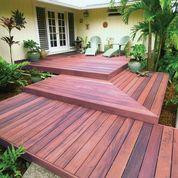Wooden decks have always been a stylish addition to the home, and while innovation and scientific advancement has given rise to alternate materials that can be used for decking, wood is still the most popular option out there.
Many different forms of wood can be used in the construction of a deck. Cedar, Ipe, Tigerwood and Redwood are among the most popular. Wood has several advantages when used for decking, let's examine a few :
It's versatile
Wood is a natural material and is readily available. It's also breathable and allows for natural climate control. Certain species of wood, such as Cedar, even have a naturally forming oil that acts as a rot and insect repellant. Wood can also be treated to intensify its natural grain, making your deck look fabulous. Whilst consumption is a hot topic today and we are all aware of environmental concerns surrounding deforestation, most deck board manufacturers harvest wood sustainably from highly controlled sources.
Additionally, unlike many other materials that depend on some form of petroleum-based product, wood is renewable, meaning that it’s carbon footprint is lower than steel, concrete or composites.
Durability
Whilst wood is a porous material, it also boasts of being extremely durable. In some applications, pound per pound, wood is comparable in strength to steel. Hardwoods such as tigerwood can provide a serviceable lifespan of around 50 years.
Additionally, the physical properties of wood means that it can absorb greater shocks than concrete can, consequently reducing strain on the human body when walking on it. Concrete on the other hand, is a very rigid material that reverses the impact back to the body, causing stress and weakness over time.
ROI
According to a report published by remodelling.net, when compared to homes with composite decks or decks made from alternative materials, a home with a wooden deck provides a higher rental, or resale yield.
Cost
Wood is an affordable resource when compared to alternative materials like composites. Softwoods such as redwood, ash and mahogany, are sourced from coniferous trees and are usually cheaper than hardwoods like tigerwood and ipe. This is because softwood trees have a shorter growth to harvest duration, which makes them more economical to grow. Hardwoods on the other hand, require decades to fully mature, but outlive softwood by 3-4 times
Additionally, softwoods are easy to work with. They require lesser effort to cut, saw and screw which consequently saves on labour costs.
Sustainable.
Wood is a renewable and recyclable resource. Ethical material providers procure timber from forests certified by regulatory authorities. This certification ensures that the wood has not been sourced through illegal deforestation. Wood can also last many years and be reused or repurposed. These features make it a sustainable option.
While wood may be the best option for your decking project, it's important to use hidden fasteners for wood decking to keep the entire structure safely and securely in place. Hidden clips for wood decking offer a great deal of strength and sturdiness, whilst being quick and easy to use. Hidden fasteners drastically also increase the natural beauty of a wooden deck, whilst preventing the formation of unwanted cracks, holes and insect infestations.
A wooden deck can be a significant feature of your home, where many happy memories can be made. To ensure optimal structural strength and the safety of your loved ones, use hidden fasteners for your next decking project.
Related Posts:
1. A Brief Guide to Deck Maintenance
2. 3 Ways Your Home Can Benefit from Fitting Outdoor Decking
3. Choose the Very Best Materials for Your Decking to Ensure a Long Life

